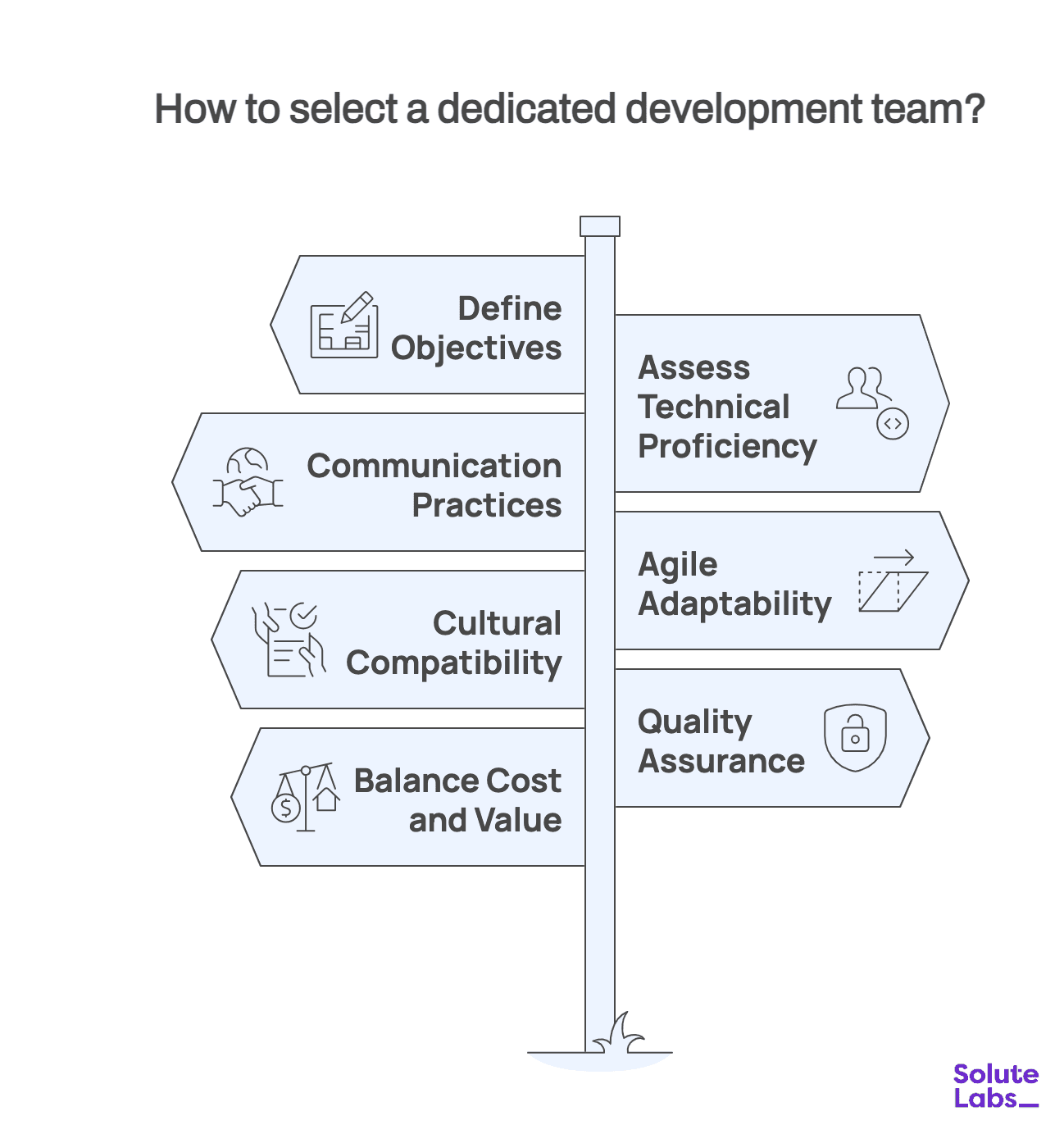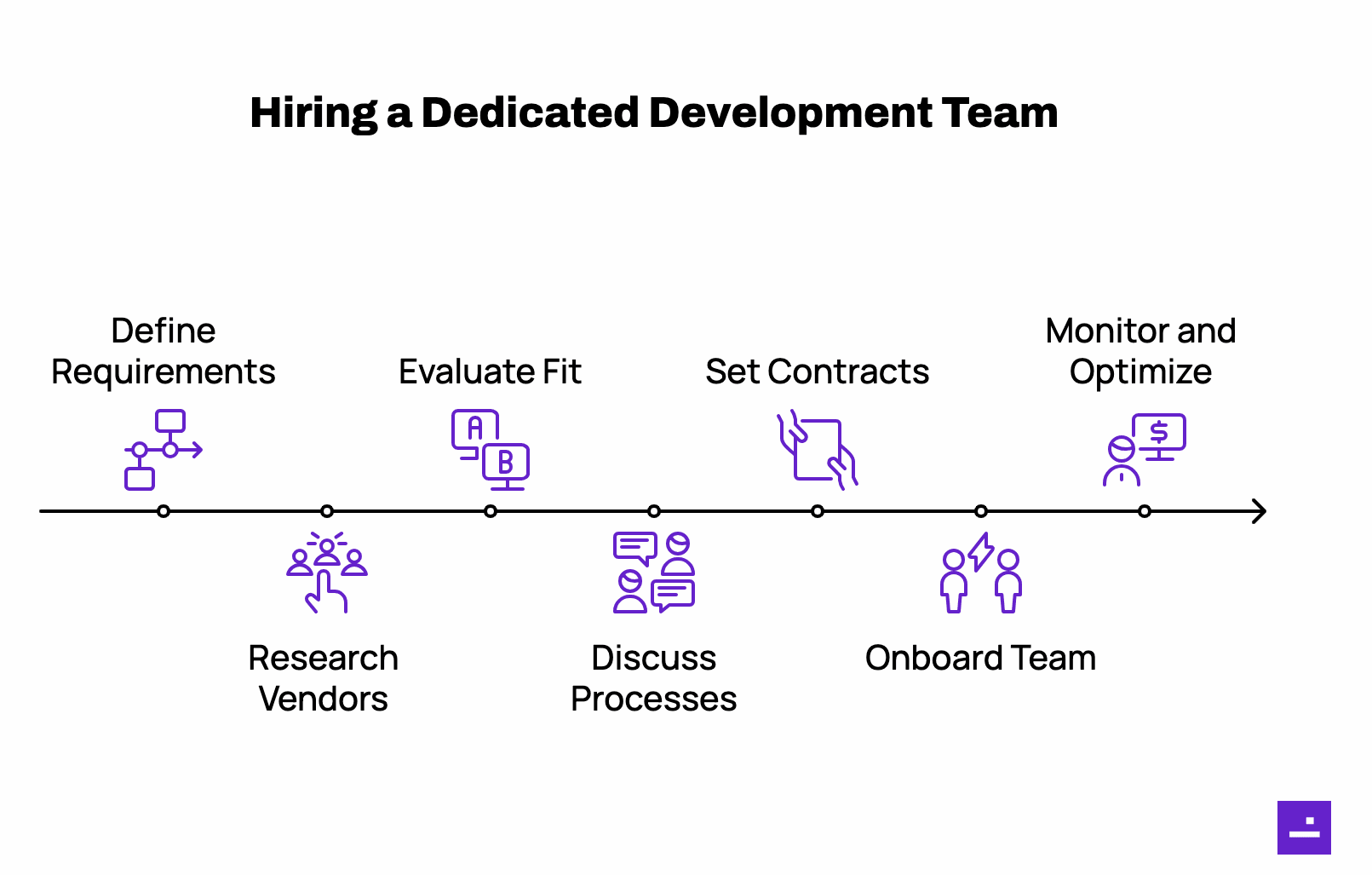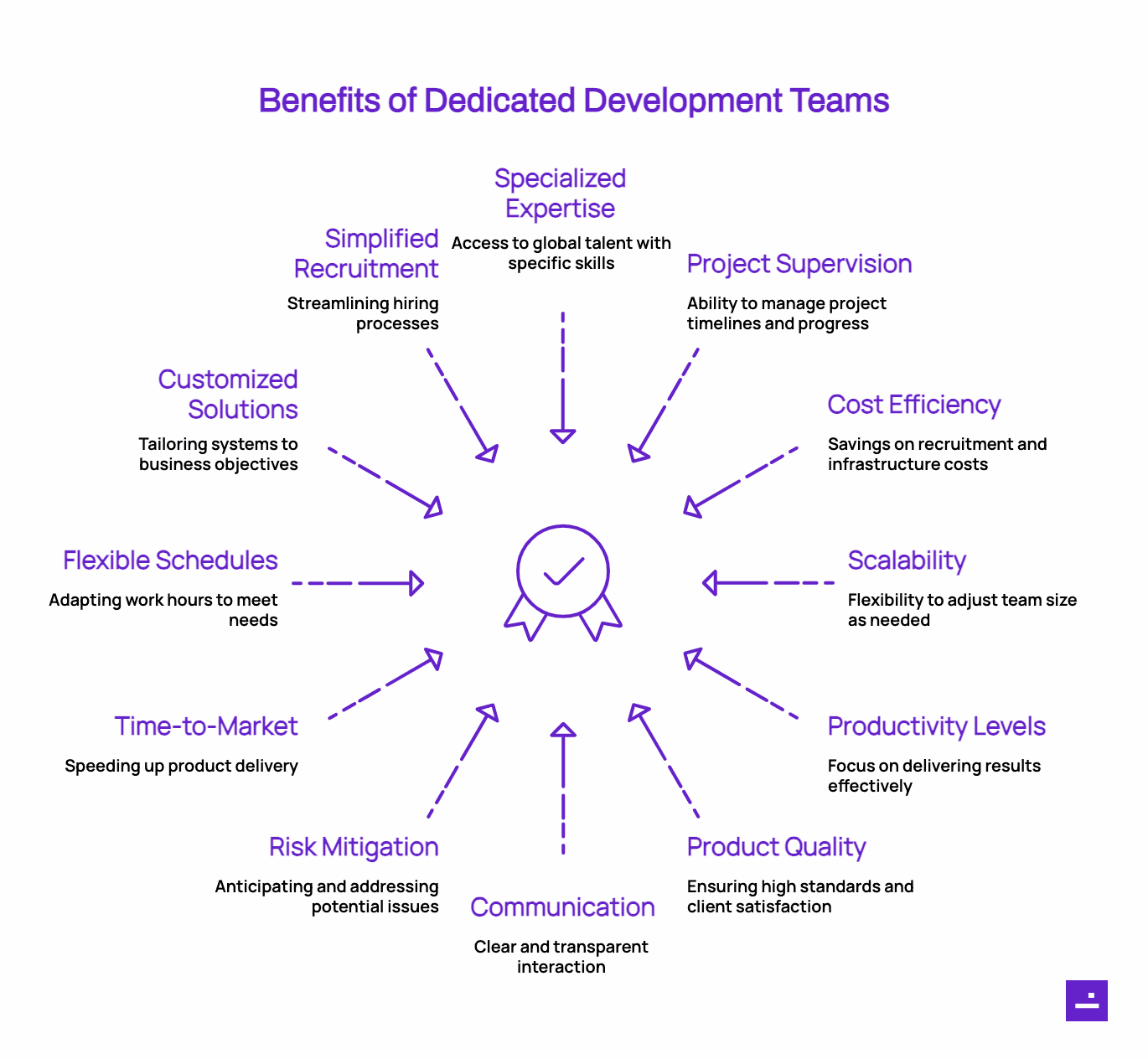Outsourcing seems to possess a more auspicious future than ever before. Grand View Research forecasts that the global business process outsourcing sector will reach $525 billion by 2030, whilst Outsourcing Insight anticipates that 31.5% of IT services will be outsourced in 2024.
It is therefore pertinent to address a frequently posed inquiry by enterprises: how to hire a dedicated development team.
This guide will examine the distinctive features of the dedicated development team model, its comparison with other engagement models, and strategies for establishing and managing a team that delivers measurable results. Businesses in the US will remain the primary focus due to the increasing need for precision, efficiency, and cost-effectiveness.
Understanding the Dedicated Development Team Model
A dedicated development team is an efficient enhancement of your organization, including a full-time, high-quality workforce focused only on your project. The staff are meticulously selected to fulfill your precise needs, correspond with your goals, assimilate into your operations, and conform to your organizational culture.
This strategy provides long-term advantages, distinguishing it from conventional outsourcing. You assemble a team of developers, designers, quality assurance professionals, and project managers, who directly report to stakeholders, advancing the product with profound subject matter understanding and consistency.
When you hire a software development team or Next.js developers, whether in-house or outsourced, it offers the flexibility of in-house development without the financial burden of employment. As your product evolves, so too should your workforce size. Establish explicit expectations, communicate effectively, and concur on the desired end to cultivate a team that operates as if it were in-house.
This method is appropriate for companies seeking a dependable collaborator for precise construction and growth.
Key Qualities of an Effective Dedicated Team
Selecting a team that combines technical know-how, adaptability, and a sense of ownership is crucial when you hire dedicated developers team. These traits are frequently found in the most effective teams:
- Strong Ownership: They focus on attaining results rather than merely outputs and regard your goals as their own.
- Clear and Cohesive Communication: Proactive involvement, regular updates, and well-defined protocols save costly misunderstandings.
- Agile Methodology: A committed team of agile developers can quickly adjust to changes, ensuring that the project stays on track even when priorities change.
- Technical Versatility: They can adjust to a variety of project requirements since they are proficient in a wide range of tools, frameworks, and integrations. Skills for Solving Problems: The top dedicated development team services anticipate problems and offer better solutions in addition to following instructions.
- Long-Term Partnership Orientation: They want to build trust and work in harmony with your internal resources.
Situations Where a Dedicated Team Delivers the Most Value
The difference between a project that moves forward smoothly and one that experiences protracted delays is frequently determined by when to engage a committed crew. Instead of merely adding staff, this idea involves putting together a committed team that works as an extension of your internal team, fully in line with your goals and timelines.
Numerous enterprises start with a framework for recruiting devoted developers, since the significance lies not alone in programming, but also in strategy, consistency, and adaptability. This method has the greatest effect in certain circumstances:
- Developing a Product from Inception: When initiating with just a concept and requiring a proficient team to actualize it from design to implementation.
- Scaling Operations Quickly: When time constraints require prompt access to supplementary developers, circumvent the delays associated with full-time recruitment.
- Managing Long-Term Projects: Ideal for multi-phase constructions where continuity of the same team fosters profound product comprehension and facilitates seamless transitions.
- Specialized Technical Requirements: If your project necessitates specialist skills, such as a particular technology stack, API integrations, or intricate structures, a dedicated team guarantees the appropriate skill set from the outset.
- Ongoing Development and Maintenance: Suitable for SaaS products or platforms requiring regular updates, feature implementations, and prompt bug resolutions without disrupting core operations.
- Expedited Prototyping and Iterative Processes: Essential for startups or creative ventures requiring swift testing and feedback mechanisms.
In a nutshell, selecting a dedicated approach emphasizes establishing a high-performance relationship rather than outsourcing. It is the difference between just completing tasks and constructing something sustainable, scalable, and competitive.
Core Roles Within a Dedicated Development Team
No two software projects are identical; hence, the composition of a specialized team will vary based on criteria such as product complexity, timelines, and budgetary constraints. Nevertheless, the majority of teams possess some essential tasks that facilitate progress in the appropriate direction. The following illustrates the roles in a dedicated development team in practice:
1. Project Manager
Think of the project manager as the guy in charge of directing the whole orchestra. They keep everyone in the loop about goals and progress, synchronize all operational components, and keep an eye on budgets, resources, and timelines. As your main point of contact, vendors typically assign a dedicated project manager who keeps you apprised of progress and heads off problems before they get out of hand.
2. Business Analyst
The business analyst is the go-between for your ideas and the technical group that will put them into action. They take stock of what you require, check that it lines up with your company's larger goals, and then map out the best way ahead. They help get a good end result by standardizing processes and getting constant feedback.
3. Software Architect
The architect would be in charge of drawing out the blueprints for your program if it were a building. They make sure that the system is fast, secure, scalable, and adaptable to future needs by choosing the technology stack and outlining the architecture.
4. Software Engineers
Backend developers function in the background, developing the logic, data management, and security infrastructures that facilitate the product's operation. Frontend developers focus on the visual and interactive elements perceived by users, designing displays, layouts, and experiences that are intuitive and engaging.
5. DevOps Engineers
DevOps engineers emphasize efficiency. They oversee automated construction, testing, and deployment, facilitating quick modifications without jeopardizing existing functionalities. They also bridge the gap between development and operations, ensuring collaborative teamwork with their cloud and DevOps services.
6. Quality Assurance Engineers
QA engineers act as the final barrier before the release of software to users. They assess each function, examine every interface, and detect faults, compliance shortcomings, or security risks, guaranteeing that your launch is dependable and polished.
How Are Teams Usually Structured?
| Project Type | Approx Team Size | Roles & Responsibilities |
|---|---|---|
Discovery Phase | Upto 5 | Business Analyst, Project Manager, Software Architect, UX Designer |
MVP Development | 6+ | Project Manager, Business Analyst, UX Designer, Frontend Developer, Backend Developer, QA Engineers |
Custom Software Build | Around 9 | Project Manager, Business Analyst, UX Designer, Software Architect, Frontend Developer, Backend Developer, QA Engineers, DevOps Engineer |
Important Factors to Assess Before Hiring a Dedicated Development Team
Selecting the appropriate individuals for your product might dictate whether it launches seamlessly or encounters perpetual delays. Prior to hiring an offshore dedicated development team, it is essential to assess factors beyond just technical competencies. The individuals you recruit will serve as an extension of your enterprise for months and even years, hence the selection must be deliberate and well considered.

1. Definition of Your Objectives and Parameters
Prior to initiating the dedicated team recruitment process, explicitly delineate your requirements. Are you creating a completely new product, expanding an existing one, or concentrating on ongoing enhancements? Clearly delineate any unique skills required for your project, such as the need for Node.js developers for a backend system, from the outset.
2. Technical Proficiency and Relevant Experience
An adept and committed agile development team transcends just coding; they assist in problem-solving and enhancing your product. Identify teams who have engaged in projects similar to yours regarding technology stack, complexity, and industry. This expertise enables them to begin immediately without a significant learning curve.
3. Practices of Communication and Collaboration
Effective communication practices are crucial when collaborating with overseas staff. Inquire about their management of time zone discrepancies, the platforms used for daily updates, and the frequency of progress report dissemination. Transparency fosters confidence and ensures project alignment.
4. Agile Methodology and Adaptability
Priorities may shift, particularly in dynamic marketplaces. A dedicated agile development team can swiftly adjust to new needs without disrupting the project timetable. This adaptability is essential for enterprises that need rapid innovation.
5. Cultural Compatibility
Skills are not the only consideration; work style and culture are also significant. A team that aligns with your methodologies for decision-making, problem-solving, and deadlines will integrate more cohesively with your internal processes.
6. Quality Assurance Procedures
Quality must never be a secondary consideration. Inquire about the team's quality assurance process, including their methods for testing features, tracking issues, and ensuring the product adheres to performance and security criteria prior to deployment.
7. Equilibrating Cost and Value
Although cost is a significant consideration, the least expensive alternative may incur more expenses over time if it results in delays or substandard quality. Assess price in conjunction with knowledge, dependability, and delivery history to get optimal long-term returns.
Ultimately, hiring a dedicated team transcends mere transaction; it is the establishment of a relationship. By meticulously evaluating these variables, you will identify individuals who can function as a genuine extension of your firm and provide dependable outcomes.
Suggested Read
Hire Dedicated Node.js Developers for Your Project
View Blog
How to Successfully Hire a Dedicated Development Team?

Bringing in a devoted team is more than simply filling seats; it's about finding the appropriate combination of abilities, communication style, and common goal to propel your project ahead. Whenever you are collaborating with a local partner or an offshore team, using a disciplined, dedicated team hiring process can help you prevent mistakes and provide a solid basis for cooperation.
1. Define Your Requirements
Begin by defining your specific requirements. This comprises the project's scope, required skill sets, technological stack, deadlines, and budget. Being specific from the outset allows you to target the correct prospects and save time later in the process.
2. Research and Shortlist Potential Vendors
Look past the fancy websites. Examine case studies, customer evaluations, and references to determine how each vendor has performed on projects comparable to yours. Consider time zone overlap and linguistic competency while working with offshore teams.
3. Evaluate Technical and Cultural Fit
The dedicated team recruiting process is more than simply evaluating technical skills; it also considers how effectively the team communicates, solves issues, and fits with your operations. Conduct interviews, technical evaluations, or even a short test project to determine compatibility.
4. Discuss Processes and Tools
Before making a choice, agree on how the team will operate. Which project supervision tools will you use? How frequently will progress updates be shared? Make certain that they can adjust to new needs without compromising delivery schedules.
5. Set Clear Contracts and Expectations
Put every detail in writing, including the scope of work, deadlines, payment conditions, communication frequency, and performance indicators. This transparency avoids misconceptions and holds both parties responsible.
6. Onboarding Effectively
Once the agreement is finalized, engage the team in your existing systems and procedures. Share paperwork, introduce them to your in-house team, and schedule frequent check-ins to establish rapport and efficiency from the start.
7. Monitor and Optimize
Hiring is simply the beginning. Monitor progress, evaluate performance, and adjust processes as necessary. Continuous optimization ensures that the team remains on track with your objectives.
By discovering hiring as a planned, committed team process rather than a one-time transaction, you boost your chances of establishing a long-term connection that provides continuous value.
Dedicated Teams vs Freelancers vs In-House Teams
| Dedicated Teams | Freelancers | In-House Teams |
|---|---|---|
Role: Remote extension of your tech team with PM, devs, designers, and QA | Independent specialists for specific tasks. | Permanent staff aligned with the company roadmap. |
Cost: Higher upfront but ~35% lower long-term vs freelancers. | Lower hourly, but hidden expenses from delays/integration. | High salaries + 30–40% overhead. |
Quality: High — shared frameworks and peer reviews. | Varies — depends on individual standards. | High — consistent internal processes. |
Stability: Strong — dedicated focus ensures continuity. | Weak — availability shifts risk delays. | Strong — steady employment secures progress. |
Scalability: Quick — vendors can add capacity on demand. | Limited — depends on freelancer availability. | Slow — tied to HR timelines. |
Benefits of Hiring Dedicated Developers for Your Business

Here are some of the benefits of a dedicated development team:
1. Access to Specialized Expertise
Engaging dedicated developers allows access to a global talent pool, including people with profound experience in certain technologies and sectors. Even in the United States – a worldwide technology leader and startup hub — there is a deficiency of such specialized talents, making this access indispensable.
2. Complete Project Supervision
A primary advantage of employing specialist developers is the capacity to oversee the project similarly to an internal team. You may manage timetables, procedures, progress milestones, and performance indicators. Contemporary project tracking solutions facilitate the oversight of tasks and promote openness between clients and developers. The one significant distinction? In-house teams function on-site, while specialized developers operate remotely.
3. Significant Cost Efficiency
In the long term, employing specialized developers demonstrates cost efficiency. You save costs associated with recruitment, onboarding, training, infrastructure, and employee benefits that accompany an internal team. Engaging specialized specialists via outsourcing often involves defined prices or pre-established budgets, ensuring predictable expenses and eliminating hidden overheads.
4. Easy Scalability
Committed developers provide unparalleled adaptability to increase or decrease your team in accordance with changing project requirements. This streamlines the recruiting process, allowing for rapid resource adjustments while maintaining constant productivity and output quality.
5. Increased Productivity Levels
Productivity is key to the devoted team approach. Their only focus is on providing outcomes effectively and punctually. By using agile processes, they provide speedy development, prompt iterations, and accelerated testing cycles, enabling swift responsiveness to input and a competitive advantage in market entry.
6. Exceptional Product Quality
Engaging committed developers entails collaborating with specialists who have proficiently mastered their technological stack, encompassing programming languages, frameworks, and tools. Their extensive practical expertise, along with innovative problem-solving, guarantees that your final product adheres to the highest quality standards and often surpasses client expectations.
7. Transparent and Clear Communication
A committed staff exclusively focused on your project promotes robust cooperation and transparent communication. This openness fosters a shared comprehension of objectives, facilitates effective issue resolution, and enhances alignment between the development process and your vision.
8. Mitigation of Risk Factors
Experienced developers may anticipate possible issues early due to their expertise across several sectors and project kinds. By meticulously delineating criteria and adhering to a systematic strategy, they mitigate risks and guarantee a stable, foreseeable growth trajectory.
9. Accelerated Time-to-Market
In the current rapid market, velocity is crucial. Committed developers expedite development durations by circumventing extended onboarding and concentrating only on execution. Their efficient operations and adept problem-solving ensure your product reaches clients more promptly.
10. Flexible Work Schedules
A significant benefit is their capacity to modify working hours to align with your time zone, company hours, or project deadlines. Dedicated developers provide schedule flexibility that accommodates your requirements, whether via continuous 24/7 work or high-intensity sprints.
11. Customized Business Solutions
These experts transcend mere coding; they develop bespoke systems, apps, and platforms tailored to your company's issues and objectives. Their strategic methodology guarantees that your software functions well while enhancing operational efficiency and providing a competitive advantage.
12. Simplified Recruitment
Recruiting and employing in-house IT professionals may be costly, protracted, and fraught with danger. Committed developers alleviate that burden by providing immediate access to rigorously screened, exceptionally qualified professionals who may begin contributing immediately, without protracted interviews or onboarding delays.
Cost Insights for Hiring a Dedicated Development Team in 2025
A common inquiry among firms is: “What is the cost of a dedicated development team?”
The reality is that there is no universal solution. Pricing is contingent upon many critical factors: the team's geographical location, the required level of skill, the project's complexity, and any supplementary services needed. Upon understanding these components, you may maintain your budget effectively.
The location is the primary determinant of cost. For instance:
- In the United States or Western Europe, hourly prices often fluctuate between $80 and $150.
- Eastern Europe typically ranges from $35 to $70 per hour.
- Numerous Asian nations, notably India, provide wages ranging from $20 to $50 per hour.
The degree of experience also influences cost. Senior developers or individuals with specific expertise may command fees that are 30–50% more than those of mid-level professionals. Projects that include intricate interconnections, stringent compliance requirements, or sophisticated design inherently need increased time and elevated expenditures. Additionally, services like as design, quality assurance, DevOps, or project management can contribute an additional 20–40% to the overall cost.
Average Hourly Rates by Region (USD)
| Region | Hourly Rate |
|---|---|
United States | $80-$150 |
Western Europe (UK, Germany, etc.) | $60-$100 |
Eastern Europe (Poland, Ukraine, etc.) | $40-$70 |
India & Southeast Asia | $25-$50 |
Latin America | $30 – $60 (varies by country) |
Addressing Common Concerns About Dedicated Teams
Organizations contemplating a dedicated team model often pose a series of basic inquiries prior to reaching a conclusion. We will answer these issues clearly and factually.
1. Loss of Project Oversight
Employing a committed team does not reduce management supervision. These teams operate as an extension of your internal personnel, according to your strategic directives, objectives, and approval protocols. Contemporary project management tools provide real-time progress tracking, milestone evaluations, and performance oversight, guaranteeing complete visibility and control.
2. Communication Barriers
Variations in location and time zones may be alleviated by systematic communication procedures. Dedicated teams consistently coordinate with client schedules, have frequent progress meetings, and use collaboration technologies to ensure ongoing alignment and transparency.
3. Quality Assurance
Quality results are ensured by meticulous vendor selection and stringent criteria. Esteemed suppliers provide pre-screened individuals with verifiable competence. Processes include peer code reviews, compliance with industry best practices, and thorough quality assurance protocols that guarantee that deliverables meet and often exceed client expectations.
4. Adjusting to Changing Requirements
An essential benefit of the dedicated team concept is operational adaptability. Organizations may augment resources, attract specialist personnel, or modify project emphasis without the delays inherent in traditional recruiting. This versatility is especially advantageous in volatile market conditions where objectives change swiftly.
5. Financial Justification
Although the hourly or monthly fees for committed teams may exceed those of freelancers, the overall value is enhanced owing to consistency, expedited delivery, and decreased onboarding periods. Clients get advantages from a workforce with extensive product expertise, reliable availability, and the capacity to sustain consistent performance over time.
In a nutshell, several initial apprehensions about dedicated teams are alleviated as firms see the operational stability, quality consistency, and strategy alignment afforded by this approach. Over time, these connections often evolve into lasting collaborations that substantially enhance long-term company performance.
Why Partner with SoluteLabs for Dedicated Development?
By selecting SoluteLabs, you are not only hiring developers. You are acquiring a dedicated staff that regards your project as their own. We choose to recruit individuals who possess a balanced combination of technical expertise, industry knowledge, and problem-solving capabilities, ensuring you get solutions that are both pragmatic and future-oriented. Our emphasis is on developing products that excel in performance, scalability, and tangible business effect, whether by constructing intricate backends, enhancing user interfaces, or incorporating third-party technologies.
What distinguishes us is our collaborative approach with you. We assert that optimal outcomes arise from transparent communication, reciprocal trust, and a flexible methodology that adjusts to your changing requirements. In addition to developers, project managers, designers, QA testers, and DevOps specialists will collaborate to ensure seamless operations. Throughout the years, we have assisted firms in SaaS, HealthTech, FinTech, and other sectors to expedite launches, uphold quality, and manage expenses, and we would be delighted to provide the same support to you.
